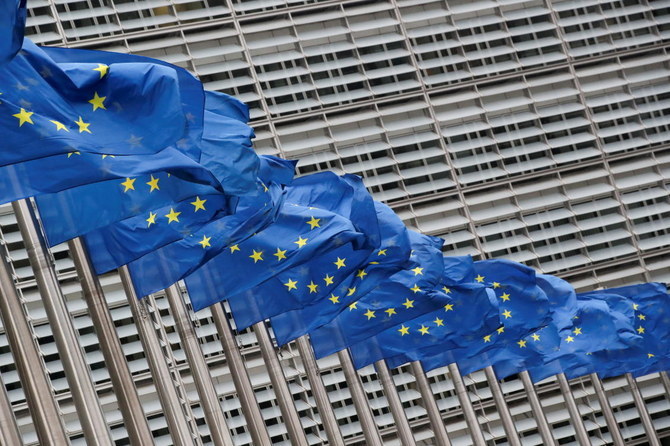
- ARAB NEWS
- 14 Jul 2025

Earlier this year, the EU and the Gulf Cooperation Council agreed on their Joint Action Program for the 2022 to 2027 period. It is an ambitious indicative plan with an emphasis on strategic cooperation, including wide-ranging energy partnership. Although the GCC-EU Joint Council, as the body comprising EU and GCC foreign ministers is called, had met dozens of times before, there was a sense of urgency at the meeting in Brussels on Feb. 21, three days before the war in Ukraine started.
The looming war was a key reason for the gravity of that February meeting, but there were also other factors that underscored the need to reenergize and upgrade the EU-GCC strategic partnership. They included Europe’s deepening energy crisis and a shared realization about the need to beef up regional security to safeguard trade routes.
GCC-EU cooperation goes back to at least 1988, when the two blocs signed their first agreement and established several bodies to shepherd their partnership, including the Joint Ministerial Council comprising the foreign ministers of all EU and GCC member states, plus representatives from the two blocs’ respective bureaucracies, the Joint Cooperation Committee, the Energy Experts Group and several other specialized groups. Their relationship has gone through some rough patches but has nevertheless endured and, judging by the recent shared euphoria, appears to be climbing toward higher levels.
A structural dilemma has contributed, unintentionally, to Europe’s energy crisis. Over the past decade, Europe has adopted new environmental policies and decided to phase out conventional energy sources, such as nuclear and coal, as well as reducing its reliance on oil and gas. These policies have led to serious shortages, as the alternatives are not produced in adequate quantities to plug the gap.
Another source of worry has been Europe’s reliance on imported energy and especially the lack of diversification of foreign energy sources. Ensuring energy independence will take some time. EU countries’ growing dependence on a limited number of energy suppliers has led to repeated declarations of adopting a new strategy aimed at diversifying supply sources, in addition to increasing reliance on renewable energies, but more work is needed to be done to develop renewables.
Despite considerable efforts to diversify energy sources and increase the contribution of renewables, the current crisis underlines Europe’s continued reliance on imported supplies. In 2020, the EU’s energy dependency rate exceeded 60 percent on average and reached up to 90 percent in some of its member states. Divestment from nuclear energy and coal in Germany, Europe’s largest energy consumer, increased its dependence on imports as the development of renewables was lagging behind demand.
As we have seen with a number of recent geopolitical developments, Europe’s energy dependency not only affected the stability of energy supplies and prices, but also limited its options in dealing with important foreign policy issues, while creating discord among its members.
The Gulf countries share some of Europe’s security concerns as well as the desire for greater diversification in trade and energy.
Dr. Abdel Aziz Aluwaisheg
Germany provides a clear example of the shifting energy picture. For both geopolitical and domestic reasons, Berlin has recently made significant shifts in its foreign and energy policies, which could lead to a comparable shift in Germany’s approach to the region. It has taken steps to diversify its energy supplies and also slow down the phasing out of coal to mitigate against potential future shortages and blackouts. Other European countries have made comparable adjustments.
The Gulf countries share some of Europe’s security concerns as well as the desire for greater diversification in trade and energy. Their joint partnership could address those concerns more effectively. For example, both sides are concerned about the security of energy supplies. The Gulf region is home to about 50 percent of global oil reserves, production and exports and a significant share of gas too. It can help Europe deal with its current shortages and rising prices. On the other hand, if Gulf energy supplies were disrupted, as Iran and its regional proxies have threatened, energy supplies and prices will be affected around the world, including Europe, making matters worse.
The growing GCC-EU partnership should contribute significantly to regional security and the security of energy supplies, including through joint work on maritime security and combating terrorism, with special reference to the protection of straits and other international passageways through which energy supplies transit.
In addition to safeguarding existing energy supplies, there is great potential for jointly developing new sources of energy, including solar and green hydrogen. The GCC countries are well suited to developing both and are seeking international cooperation in these two areas.
GCC-EU bloc-to-bloc frameworks serve a useful purpose in energy cooperation through sharing knowledge and best practices. However, the heavy lifting of actual fulfillment of energy security and diversification is best undertaken bilaterally, state-to-state or through private sector actors from both sides. The large-scale funding needed for energy megaprojects may require joint ventures by competent companies working together directly.
The recent news of Saudi Arabia’s undertaking to build a huge hydrogen plant with a daily capacity of 650 tons of environmentally friendly green hydrogen is one example of international partnership, with Saudi and American companies joining hands to complete the project by 2026. News about green hydrogen projects in the UAE, Oman, Egypt and Morocco provide further evidence of the potential for global cooperation to increase clean energy supplies and provide energy security at the same time.
• Dr. Abdel Aziz Aluwaisheg is the GCC assistant secretary-general for political affairs and negotiation, and a columnist for Arab News. The views expressed in this piece are personal and do not necessarily represent GCC views.
Twitter: @abuhamad1